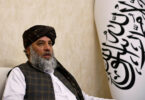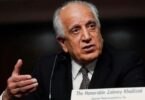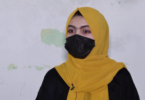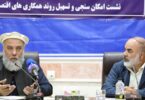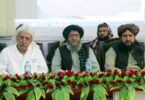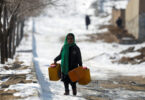KABUL (Pajhwok): August 15 was the day when Afghanistan’s political system changed and the Islamic Emirate replaced the Islamic Republic, but what changed in terms of security, economy, domestic and foreign policy. What do the political, economic, military and former government officials say and what is the response of the current government officials?.
In this report, Pajhwok analyzed the first half year of the Islamic Emirate rule, assessing what people gained and what they lost. Amanullah Peyman, a political analyst, said that the lack of recognition of the current government by the international community and lack of political and diplomatic relations of the government is a major political crisis for Afghanistan.
He said the Islamic Emirate should get benefit from the experiences of its previous regime to form a government that meets religious and international standards, human rights, and scientific and technological advances. He called on the current government to convince the people of Afghanistan and the international community and to establish an inclusive government.
On the other hand, Wadir Safi, another political affairs expert, says that the collapse of the previous government and the establishment of the new administration could be a positive development, but cautioned that the situation of the country could turn worse if needed steps are not taken. People were tired of the previous government because of rampant corruption and lack of security in the country, he said.
Absence of the law was the biggest flaw of the government in the past six months, he said. “So far, the government was unable to declare a political regime of its own,” he said. “It is true that there is a divine law and the Qur’an is a complete book, but its interpretation is not easy for the general public and needs to be understood, so a law must be drafted in consideration to the current realities,” he said.
Other Islamic countries in addition to Islamic law, they also have civil laws, penalties and laws for the development of society, so Afghanistan should also have these laws, he added. He believes Afghanistan’s foreign policy has worked for the government’s recognition and sought assistance to prevent a humanitarian crisis in the country in the last six months.
End of war and genocide, establishment of nationwide security, prevention of corruption and reduction of criminal offenses are the greatest achievements of the current government in the last six months, he said. However, he criticized the recent abductions and detentions and said that the government of the Islamic Emirate is responsible for anything happening in the country.
About the non-recognition of the current Afghan government, he said that foreign countries have some rules for recognizing governments to see whether the current Afghan government gives people their rights or not. Safi believes that the current government should gather representatives from all provinces of Afghanistan under one umbrella for its recognition. However, he criticized the government and says, “Why do not they do this, do they not have confidence.”
However, representatives of the current government have always said that the current government has the support of the people and will soon be recognized by the international community. Mohammad Radmensh, former spokesman for the Ministry of Defense, says the former Afghan army started building in 2002 at a cost of billions of US dollars.
He said that the former government had 22,000 combat and transport vehicles, 227 aircrafts and hundreds of thousands of weapons which were left to the current administration. He claimed that a large number of vehicles and weapons had been smuggled abroad. He believed that no right measures had been taken after the collapse of the former government and there was a lack of professional individuals in the current army who could not guarantee national sovereignty, territorial integrity and independence.
However, Enayatullah Khwarazmi, the current spokesman for the Ministry of Defense, says the previous administration had left them with nothing but disorder and mess. During the last six months, the army is completed by 80 percent and more than 40 aircrafts are repaired for reuse, he said.
He denied smuggling of weapons and military equipment abroad, but said that there may be small cases, but the officials of the government were seriously following such cases. Khwarazmi said that 90 percent of the former army soldiers currently worked with them in the administrative and professional sectors, except those who were directly engaged in war with them. If needed, they will also be recruited in new ranks, he said.
The leadership of the Ministry of Defense is trying to form a well-equipped, independent and strong army to defend the country without the need for foreign aid, he said. Meanwhile, Lutfullah Hakimi, head of the Clearing Commission of military ranks, says that 4,200 people have been removed from the Islamic Emirate since the commission began its work. He talked about the strong plans of the commission for removing opportunist figures from military ranks and said, “Anyone who works for the defamation of the Islamic Emirate would be expelled.”
On the other hand, he says that 2800 complaints have been processed during the work of the commission and assured that all people’s complaints will be responded to. Nasir Mohtasibzada, an economist, says the rule of the Islamic Emirate was also followed by the collapse of the banking system, freezing of the Afghan assets, non-recognition of the current government by the international community and the reduction of international aid, which affected economic growth.
However,he said that considering the official figures, the level of government revenues has risen compared to the previous year, mainly due to elimination of corruption and prevention of embezzlement. “We do not see the impact of this increase in revenue on people’s daily lives,” he said.
Referring to the frozen assets of Afghanistan in the US, he said, “This money is Afghanistan’s money, it does not belong to the previous government or the current government.” He asked the international community to show flexibility with the current government and asked the current Afghan administration to change its domestic and foreign policy so it would convince donor organizations.
“We can reach our economic goal if we create jobs, we cannot attain economic growth if we do not start infrastructural projects, activate our agriculture and industrial sectors and prevent flight of professional figures,” he said. He believed that the only way in the current situation is “to move with the world and in harmony with the policies of the international community, and to regain the trust of donor organizations.”
Pajhwok tried to have the views of government officials about the country’s economic sector, but no one responded. Marzia Hafizi, a journalist who currently owns a clothing brand, believes that women have lost a lot during these six months, while not gaining anything. She said restrictions have increased and public sector educational centers are closed for girls and people who worked in various fields have now lost their jobs and stayed at their homes.
Hafizi stopped her business three months after the fall of the previous government, but after another three months, she reopened her business. She said people feared a lot in first days of the new government and most of women stopped their activities. Security situation improved but restrictions have limited women’s activities, she said. She believed that change of governments was a norm, but life should go as normal and changes should not make people’s life difficult.
He said: “It is right that every system has its own rules, but the rules should not be as such to discourage the people of the country.” Hafizi urged current government officials to provide job opportunities to the people, respect privacy and women, and adhere to freedom of expression. According to him, no Afghan wants to leave his/her country unless he/she is forced to do so.
Samira Khairkhah, a civil society activist, said the half-year rule of the Islamic Emirate was marred by the collapse of the banking system, the absence of elites and professionals in the administration, the lack of planning to reactivate educational institutions, and restrictions on Afghan women. She was worried about the return of restrictions of the Taliban’s previous regime and losing basic rights of Afghan women. “Half of the Afghanistan’s population is made up of women, these women are still struggling for their basic rights and the current authorities should not try to assert their authority by imprisoning protesting women,” she added.
Hujjatullah Mujadedi, executive director of the Free Journalists Association of Afghanistan, said that in the initial days of the Islamic Emirate, there were difficulties in terms of personal safety, job security and access to information for journalists. According to him, with the change in political system, 40 percent of media outlets were closed and 60 percent of male media employees and 80 percent of female media employees lost their jobs. Regarding the access to information, he said it was limited in the beginning due to the lack of spokespersons, but now it has more than 40 speakers and access to information became effortless.
Dr. Mohammad Hashim Wahaj, head of the Wahaj Hospital, said with the new government and the freezing of Afghan assets by the US, a number of health centers were closed, maternal and child mortality increased, and 98 percent of the Covid-19 hospitals were closed. According to him, in these six months, the cases of malnutrition increased and the health condition of the country started to deteriorate.
On the other hand, he warns of a shortage of medicine in hospitals, saying that the continuation of this situation could increase challenges in the country’s health sector. However, he explained that the main reason for the lack of medicine is the banking problems and the freezing of the money of the companies that were importing medicine. He emphasizes that the main reason for the current situation in the country’s health sector is the freezing of the Afghan asset.
Dr. Javed Hajir, a spokesman for the Ministry of Public Health, said that during this time they have been able to keep 17 government hospitals active across Afghanistan but with limited facilities. He added that during the past six months about 1.3 million people received the coronavirus vaccine and four million received services. According to him, talks are underway with international donors to fund more Afghan hospitals.
Dr. Azizuddin Himmat, head of the Afghan psychological association, said: “Since the start of the conflict in Afghanistan the mental illnesses increased. Referring to a report by Deutsche Welle in Germany, he said that 15 million Afghans have mental health problems; However, he adds that the number of people suffering from this disease is much higher. He considers war to be the main cause of mental illness in the country, followed by unemployment and poor economic conditions.
Sher Mohammad, who studied pharmacy and worked in a pharmacy before the current government came to power, and currently he is selling boots on a handcart. He says before the arrival of the Islamic Emirate, tens of young Afghans were killed on both sides due to the war, and this is not the case now. In his view, this is the biggest achievement in the last six months. But he says a large number of young people lost their jobs and business. He called on the Islamic Emirate to provide jobs for the people, and called on the international community to release the Afghan assets.

